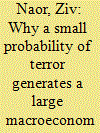| Srl | Item |
| 1 |
ID:
140831


|
|
|
|
|
| Summary/Abstract |
We revisit the causal relationship between military spending and unemployment in the G7 countries applying a bootstrap panel causality analysis that accounts for both cross-sectional dependence and for heterogeneity across countries. Using per capita real GDP as a controlled variable, we found a unidirectional causality running from military spending to unemployment for Canada, Japan, and the US, one-way causality running from unemployment to military spending for France and Germany, and bidirectional causality for Italy and the UK. The empirical evidence does not seem to provide consistent results regarding the causal relationship between military spending and unemployment in G7 countries.
|
|
|
|
|
|
|
|
|
|
|
|
|
|
|
|
| 2 |
ID:
140827


|
|
|
|
|
| Summary/Abstract |
This paper examines the short-run behaviour of migrant remittances in the face of terrorism. Using monthly data for post 9/11 terrorist attacks in Pakistan, the study finds evidence of increase in the volume of remittances sent from abroad. This increase is evident in the aggregate, as well as for the three main source regions of North America, the Persian Gulf and Europe. The positive association holds for all the top five migrant-hosting countries of Pakistan. The findings point in favour of an altruistic behaviour of migrant remittances at the macroeconomic level.
|
|
|
|
|
|
|
|
|
|
|
|
|
|
|
|
| 3 |
ID:
140832


|
|
|
|
|
| Summary/Abstract |
There has been a distinct trend of military service system change from conscription to enlistment around the world. This study aims to investigate how this change affects the demand for military expenditure. Our model is based on neoclassical model. Empirically, a two-break unit root test is applied to test the endogeneity of structural changes along with the system change. Then, an autoregressive distributed lag model is used to examine the effects on military expenditure. The empirical results show that the demand for military expenditure partly coincides with the system change. The effect of GDP on military expenditure is larger in countries with conscription than in those with enlistment.
|
|
|
|
|
|
|
|
|
|
|
|
|
|
|
|
| 4 |
ID:
140833


|
|
|
|
|
| Summary/Abstract |
Terrorist attacks adversely affect the Pakistani stock market. However, such effect is short-lived: the market recovers from terrorist shocks in one day. The impact of attack depends on the locations and types of attack. The more severe the attack (i.e. more people killed), the more negative is the KSE-100 index return. Most interestingly, stock market contains information about future attacks. In sum, different tactics of terrorists have varied effects on financial markets, which in turn can predict terrorist attacks.
|
|
|
|
|
|
|
|
|
|
|
|
|
|
|
|
| 5 |
ID:
140829


|
|
|
|
|
| Summary/Abstract |
This study documents that unforeseen events like terrorist attacks can be linked to the formation of Economic Sentiment after controlling for sentiment’s economic drivers. By utilizing dynamic panel techniques, the Economic Sentiment Indicator, as well as one of its constituents Consumer Sentiment, for a pan-European panel of 27 countries appear to be negatively influenced by terrorism activity. Moreover, these negative effects are significant only in the post-9/11 era.
|
|
|
|
|
|
|
|
|
|
|
|
|
|
|
|
| 6 |
ID:
140828


|
|
|
|
|
| Summary/Abstract |
It has been shown that terror activities have had a substantial macroeconomic impact. This work presents a macroeconomic model showing quantitatively that an increase in the probability of terror-induced death such as that observed in Israel in 2001–2004 is consistent with the documented contraction of economic activity associated with the impact of terror. The model includes fear of terrorism, represented as a higher level of probability perception than the cumulative-prospect theory expects, and a local government that can supply the public with a security good. The effectiveness of the production of the security good plays an important role in determining the terror-induced loss of production to the economy.
|
|
|
|
|
|
|
|
|
|
|
|
|
|
|
|